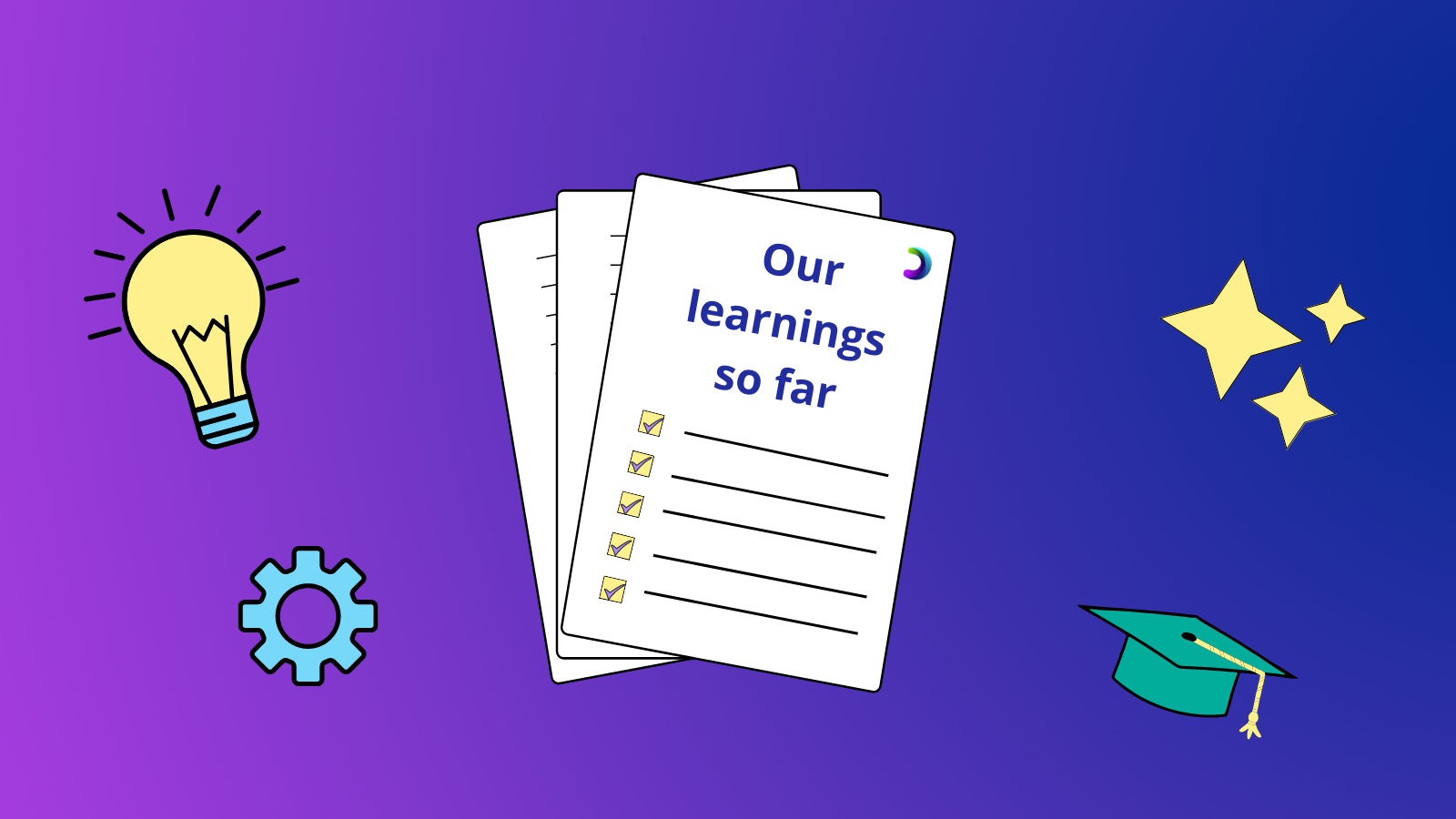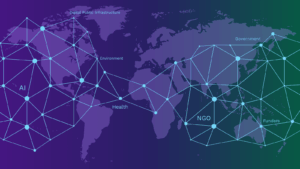It’s been one year since the Datasphere Initiative was publicly launched on April 5, 2022, on the occasion of a G7 multistakeholder meeting. The virtual launch event brought together almost 300 policymakers, governments, companies, non-governmental organizations, international organizations, and philanthropic foundations, from over 70 countries.
A lot has happened since that day. The Datasphere Initiative has incorporated as a not-for-profit foundation, appointed a board of trustees, welcomed 15 fellows and numerous partners into its global network, and developed insights and resources on responsibly unlocking the value of data for all. In this blog, the Datasphere Initiative shares our team’s key learnings over this past year and the persisting challenges we collectively face to responsibly unlock the value of data for all.
- We still struggle with data governance
- We do not have the right institutional frameworks
- We should coordinate more effectively
- We must connect policy and technology silos
- We need more experimentation

1. We still struggle with data governance
Unhelpful analogies, such as “data is the new oil” or “data is the new gold” persist in policy dialogues. Yet, data is a non-rival resource, with a multi-dimensional nature. Understanding its nature can vastly impact the selection, the representation, and thus the value of data itself – and thus the policies that are meant to support an inclusive data economy.
Approaches to data policy are still focusing on the individual and individual interests, leaving out the value of community and collective approaches to data governance. In fact, while data protection and privacy are important when it comes to personal data, non-personal data itself can also be the source of enormous value creation. Policy conversations are still too often framed around value extraction or the monetization of data, often forgetting the societal impact and benefits of data-sharing and use.
Since our release of the reports “We Need to Talk About Data” and “Hello Datasphere,” which introduce the concept of the datasphere and how it can be a useful framework to approaching data governance, it has been fascinating to see the myriad of applications and uses of the concept of the datasphere. The work of our Fellows is helping to hone the concept and explore how its application can encourage new thinking on data policy.
In our second year, the Datasphere Initiative will continue to encourage organizations and individuals to step back and unpack our relationship with data. We are planning more dialogues, events, and thought pieces to showcase its multidimensional nature, and how data governance challenges are creeping into numerous sectors.

2. We do not have the right institutional frameworks
Discussions about data governance are still taking place in multiple sectoral and policy silos, while some might be justified, most occur often far from the practitioners or affected agents. While our use (or lack of use) of data can have major effects on human societies, no parallel evolution has taken place regarding political and governance tools.
As explored in the report “Hello Datasphere”, studies of complex adaptive systems clearly show that they cannot easily, let alone predictably, be handled through rigid external command and control rules. Ensuring that a system remains within acceptable boundaries requires iterative adjustments to the elaborate web of positive and negative feedback loops governing its emergent behavior.
It is time for international, regional, and national institutional architecture to adapt to this changing paradigm. This does not mean replacing existing governance institutions, but rather understanding the role of data in each context, connecting across silos, and complementing them with agile processes, frameworks, and institutions that foster collaboration and trust.
The Datasphere Initiative will organize a Summit to connect stakeholders across-sectors and geographies to share ambitions and identify bottom-up innovations and collaborations to responsibly unlock the value of data for all.

3. We should coordinate more effectively
Less than ten years away from the deadline for the achievement of the Sustainable Development Goals, many are approaching data governance within the context of a particular disciplinary standpoint – be it healthcare, agriculture, or security. Donors, as well as funded agencies and initiatives, are facing a complex web and fragmented environment that is hard to navigate and that tends to derive in people demanding accountability from funders, and funders being far from generating the impact that they could spark.
The lack of shared terminologies, data standards, and data interoperability is also leading to a complex, overlapping web of legislation with a real-life impact on how people can actually cooperate and share data. For example, cataloging and connecting naming conventions for data categories used in livestock populations highlight some of the challenges that arise when policies specify different definitions of data categories.
More interactions are needed between policymakers, technical communities, funders, civil society organizations, initiatives, and other groups so that work and learnings can be shared and coordinated. Work towards a more equitable data economy also needs tools to navigate this complex environment and understand the data governance landscape to better target their efforts.
Building on the Datasphere Governance Atlas, a mapping of over 260 organizations working on data governance around the world, the Datasphere Initiative is scoping ways to leverage and expand this research into an interactive coordination platform. This will provide real-time, in-depth information on the organization and initiatives shaping and framing the data policy landscape.

4. We must connect policy and technology silos
Data governance is not a technological issue but a societal one, that warrants a variety of diverse, cross-sectoral, and multistakeholder perspectives. As sectors such as renewable energy and health continue to digitalize, increasing amounts of data policy challenges will arise and call for data literacy skills and new thinking.
Data is a reflection of society and the inequalities and biases within it. Data currently underpins the majority of socio-economic and political decisions. This means that equity in the data economy is vital to distribute the benefits derived from data. As our use of data becomes more prevalent, all voices need to be heard in data governance, especially those from underrepresented communities, the Global Majority, and youth – the seeds of our digital future.
Specific communities and regions are being impacted differently by the data economy, which is why understanding their needs and the challenges they face is key to developing inclusive solutions. One interesting example that connects to data governance and its relationship with society was developed by one of the policy teams which counted with Datasphere Initiative team members at Harvard’s Berkman Klein Center Fal 2022 research sprint. This sprint built an Inclusion Framework to assess inclusivity in digital identity systems, which implies that diverse communities and perspectives are incorporated at the awareness, access, and integration levels. What is exciting about this framework is that it could be used in other settings (e.g., the data economy) to enhance inclusion at the technical and policy levels.
As a prize winner of the Omidyar Network Future of Data Challenge, the Datasphere Initiative is launching a project to develop awareness-raising and learning campaigns, to showcase the voices and experiences of youth from the United States on how data shapes their lives. Results and learnings will be shared to bridge gaps between youth and decision-makers through structured advocacy and outreach.
To expand our understanding of data governance and its relationship to Artificial Intelligence’s impact on society, the Datasphere Initiative will also be continuing its webinar series with the D4D Network to understand trends and challenges arising across regions, particularly in the Global Majority.

5. We need more experimentation
Many governments are dealing with the challenge of benefitting from the exchange of data and the desire to control it. Balancing two opposing risks of excessively limiting the sharing of data and eroding trust, security, and economic and social value.
There is a pressing need for a different and innovative approach. One that is proactive, systemic, transdisciplinary, and evidence-based, that establishes the appropriate safeguards to legitimate concerns, while maximizing well-being for all through the creation and distribution of social and economic value.
Sandboxes for data could help us experiment with agile solutions that find the right equilibrium between too many restrictions on the flow of data and too much openness and developing responsible ways to unlock the value of data for all. What is more, in a world where interoperability is needed around the interface between technical and policy layers, sandboxes can help regulators and technologists collaborate to test policies, products, and services.
As part of the Global Forum on Sandboxes for Data, the Datasphere Initiative is launching an Africa Forum on Sandboxes for Data. The effort will build a pan-African community to enable innovative cross-border data governance solutions and invite local, regional, and global experts to explore the ways in which regulatory and operational sandboxes could facilitate responsible data flows and exchange.
Another area where experimentation will be key is around data communities. As more and more populations start to understand the potential value of their data, different data-sharing communities are on the rise, notably: data trusts, data collectives, data fiduciaries, and even data unions.
These data communities often need to set up governance frameworks organizing, inter alia: membership conditions, types of data shared, purposes, distribution of potential benefits (if any), and modalities of cooperation with third-party actors. The cost of drafting and approval of such legal arrangements is high: it is a time-consuming and financially burdensome effort that represents an additional disincentive to cooperation, particularly for smaller organizations, NGOs, start-ups, or SMEs.
The Datasphere Initiative with interested partners would like to start a specific effort focused on this often overlooked barrier to data sharing. The development of Template Charters for Data Communities could significantly reduce transaction costs for actors, provide predictability, and help responsibly unlock the value of data for all.
This blog shared some of our key learnings, one year since the launch of the Datasphere Initiative. Persisting challenges remain to responsibly unlock the value of data for all, and addressing these issues will take an ecosystem of organizations working at community, national, regional, and global levels across sectors and disciplines.
The Datasphere Initiative plans to further collaboration and connectivity between the vast number of actors working on the multidimensional issue of data governance in 2023, through dialogues, intelligence gathering, and experimentation with sandboxes.
Stay tuned for our next strategic work plan and announcements on how partners and friends can contribute.
If you would like to join the Datasphere Initiative as a friend or partner, please reach out to [email protected]!




